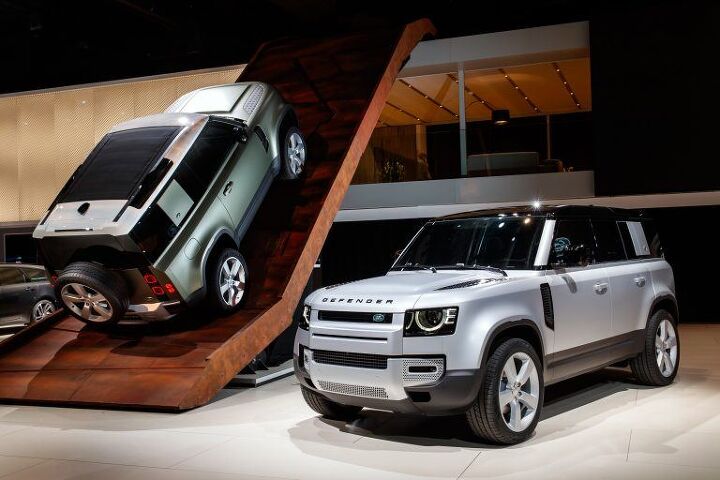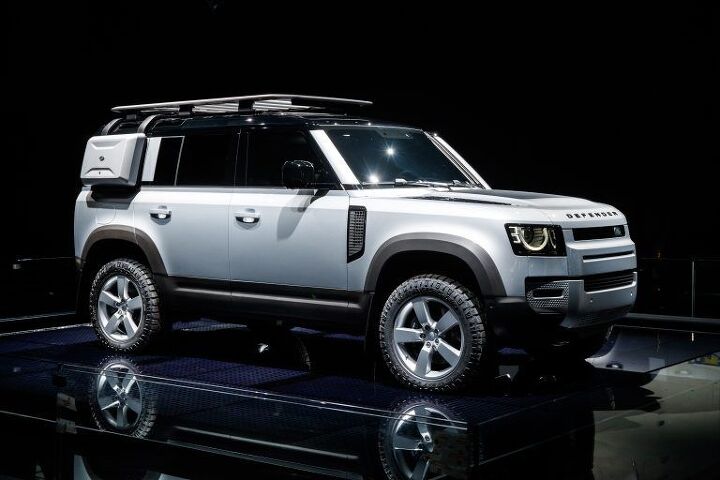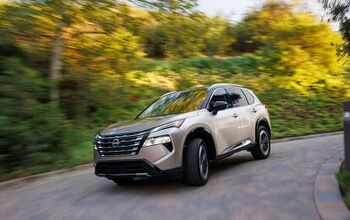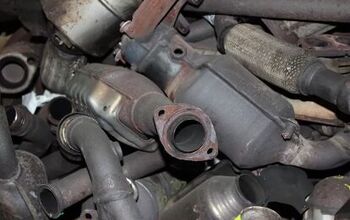2020 Land Rover Defender Returns as Jack of All Trades

Land Rover’s Defender has returned and, based on the marketing materials furnished by the manufacturer, you’d think every model came with Jesus riding shotgun. The 2020 Defender is all things to all people. Exciting, powerful, comfortable, rugged, efficient, and on the bleeding edge of automotive technology, the new model really gave Land Rover an opportunity to pat itself on the back when it debuted in Frankfurt on Tuesday.
However, we’re not wholly convinced the company deserves to be relentlessly mocked for its enthusiasm — at least not this early in the article. There has been a clear effort made to ensure the off-roader has the broadest appeal possible, which has kind of been the model’s trajectory for as far back as memory allows. Besides, we don’t know for certain that the Defender’s evolution into a Swiss Army Knife is even a problem until we’ve driven one. But there will be a few issues we’ll have to address on principle, especially its move to unibody construction.
As nice as the new aluminum monocoque is bound to be on road, off-road fanatics are taking to message boards the world over to express their warranted frustration. But perpetual muddin’ isn’t the path Land Rover chose to take and the Defender isn’t exclusively for people who live in large, woodland homes with dirt-track driveways anymore. It’s an urban runabout, chic status symbol, ORV, luxury cruiser, and more.
While still split by size into the four-door 110 and two-door 90 designations ( neither of which represent its actual length in inches anymore), Land Rover will also offer four accessory packages for the Defender called Adventure, Country, Explorer and Urban. These packs furnish the model with a diverse array of inclusions that help it establish which part of the world it most wants to conquer.
Adventure adds hard carrying cases to the side of the vehicle and throws an air compressor in the rear. There’s also a water tank that can work in combination with the compressor to spray off any mud that had accumulated during excursions. Mud flaps, scuff plates, and a spare tire cover are also included.
Explorer also gets the brunt of those accessories, minus the air compressor and water tank, whilst adding a roof rack, raised air intake, and larger fender flares.
Country is sort of a bizarro version of the Explorer. It swaps the extra storage (both internal and external) for that air pump and water vessel/sprayer.
Urban focuses on shielding the Defender from potholes and curbs by throwing on some scuff plates in key areas. Mud flaps and cargo features are also absent to ensure a cleaner look. The Urban similarly gussies up the interior slightly but has the least going on overall (making it the cheapest accessory pack). Fortunately, it seems as though you’ll be able to mix-and-match — meaning you can equip the Defender however you’d like.
Now that we’ve gotten the marketing theory behind the new Defender out of the way, let’s look at the platform can actually do. Available engines include a 296 horsepower 2.0-liter turbo with 295 foot-pounds of torque and a 3.0-liter mild hybrid in the inline-six formation. The former will be going into Defenders with the P300 designation while the latter will be slotted into the P400 offering 395 hp and 406 lb-ft. In the Defender 110, those motors are good for a proposed zero-to-60 time of 7.7 and 5.8 seconds respectively. Anticipate examples of the 90, unburdened by accessories, to be about a tenth of a second quicker. Top speed is electronically limited to keep you under 120 mph and, when properly equipped, the automaker said to expect a maximum towing capacity of 8,200 pounds.
Land Rover also said plug-in hybrid and diesel options will be available. Expect more on those powertrains at a later date, probably with us also mentioning the diesels won’t be available in the U.S. All Defenders come with an eight-speed ZF automatic and all-wheel drive. Low range is included, as is a locking center differential and an “Active Rear and Locking Differential” that we’re less certain about. Presumably it’s an automatic locking rear differential with a branded name.
Overhangs are relatively short — yielding approach, breakover and departure angles of 38, 28 and 40 degrees respectively. Ground clearance is 11.45 inches (291 mm) and Land Rover claimed the Defender can ford into waters up to 35.4 inches deep. There’s also been a water-centric, depth-estimating Wade program incorporated into its Terrain Response 2 system, which has been upgraded to allow experienced off-roaders to customize their own settings. Fortunately, those less experienced with rocks and mud can choose presets or simply allow the car to figure out the terrain by itself by switching Terrain Response to automatic.
We would be careful not to park it in soft ground, however. Despite using a bunch of lightweight aluminum in the construction, the 2020 Defender is a bit of a pig. Two-door 90s with the 3.0-liter engine aren’t terribly far from 5000 lbs and you’ll easily have surpassed that mark if you option the larger model with a 5+2 seating configuration.
Pricing is pretty steep. The 110 is currently the only model Land Rover feels confident selling in North America and it starts at $49,900 before tacking on the $1,025 destination charge. That comes with the base 2.0-liter motor, white 18-inch steelies (which are actually kind of cool), and a very decent amount of standard tech (blind spot, lane keeping, cameras galore). Navigation is included and all models’ 10-inch multimedia screens come with a online/data plan by default. Land Rover is also hyping its new Pivi Pro infotainment system’s over-the-air updates, suggesting they would “provide the latest software at all times, anywhere in the world.” We’re not sure why the Defender would need this but… it has it.
We’re imagining most people won’t settle for the base model, though. Unfortunately, optioning the 3.0-liter motor immediately tacks on $12,350 and those purposeful accessory packages can add another few hundred (for the Urban) or a few thousand (for the Explorer). That’s all before you start getting into driver assistance packages, wheel options, off-road packs, paint options, and any accessories you might have missed — like bench seats up front, pet packages, an inflatable awning, and personalized tread plates. Just be careful, it’s not a lot of work to get the Defender’s price dangerously close to $100,000 and a lot of those accessories are pretty tempting.
[Images: Jaguar Land Rover]

A staunch consumer advocate tracking industry trends and regulation. Before joining TTAC, Matt spent a decade working for marketing and research firms based in NYC. Clients included several of the world’s largest automakers, global tire brands, and aftermarket part suppliers. Dissatisfied with the corporate world and resentful of having to wear suits everyday, he pivoted to writing about cars. Since then, that man has become an ardent supporter of the right-to-repair movement, been interviewed on the auto industry by national radio broadcasts, driven more rental cars than anyone ever should, participated in amateur rallying events, and received the requisite minimum training as sanctioned by the SCCA. Handy with a wrench, Matt grew up surrounded by Detroit auto workers and managed to get a pizza delivery job before he was legally eligible. He later found himself driving box trucks through Manhattan, guaranteeing future sympathy for actual truckers. He continues to conduct research pertaining to the automotive sector as an independent contractor and has since moved back to his native Michigan, closer to where the cars are born. A contrarian, Matt claims to prefer understeer — stating that front and all-wheel drive vehicles cater best to his driving style.
More by Matt Posky
Latest Car Reviews
Read moreLatest Product Reviews
Read moreRecent Comments
- FreedMike Apparently this car, which doesn't comply to U.S. regs, is in Nogales, Mexico. What could possibly go wrong with this transaction?
- El scotto Under NAFTA II or the USMCA basically the US and Canada do all the designing, planning, and high tech work and high skilled work. Mexico does all the medium-skilled work.Your favorite vehicle that has an Assembled in Mexico label may actually cross the border several times. High tech stuff is installed in the US, medium tech stuff gets done in Mexico, then the vehicle goes back across the border for more high tech stuff the back to Mexico for some nuts n bolts stuff.All of the vehicle manufacturers pass parts and vehicles between factories and countries. It's thought out, it's planned, it's coordinated and they all do it.Northern Mexico consists of a few big towns controlled by a few families. Those families already have deals with Texan and American companies that can truck their products back and forth over the border. The Chinese are the last to show up at the party. They're getting the worst land, the worst factories, and the worst employees. All the good stuff and people have been taken care of in the above paragraph.Lastly, the Chinese will have to make their parts in Mexico or the US or Canada. If not, they have to pay tariffs. High tariffs. It's all for one and one for all under the USMCA.Now evil El Scotto is thinking of the fusion of Chinese and Mexican cuisine and some darn good beer.
- FreedMike I care SO deeply!
- ClayT Listing is still up.Price has been updated too.1983 VW Rabbit pickup for sale Updated ad For Sale Message Seller [url=https://www.vwvortex.com/members/633147/] [/url] jellowsubmarine 0.00 star(s) (0.0) 0 reviews [h2]$19,000 USD Check price[/h2][list][*] [url=https://www.ebay.com/sch/i.html?_nkw=1983 VW Rabbit pickup for sale Updated ad] eBay [/url][/*][/list] Ceres, California Apr 4, 2024 (Edited Apr 7, 2024)
- KOKing Unless you're an employee (or even if you are) does anyone care where physically any company is headquartered? Until I saw this story pop up, I'd forgotten that GM used to be in the 'Cadillac Building' until whenever it was they moved into RenCen (and that RenCen wasn't even built for GM). It's not like GM moved to Bermuda or something for a tax shelter (and I dunno maybe they ARE incorporated there legally?)










































Comments
Join the conversation
I Think it's a decent vehicle but I agree maybe not a Defender? Tow rating is good offroad specs aren't to horrible and LR has a history of offroad tech that makes up for some physical shortcomings. I like the interior. Inline 6 seems nice. Uni body doesn't bother me. If I were going to make a defender I would have taken a hard look at solid rear axle or independent portals. I think the new G class might be a good example of keeping at least the rear solid. I would also have given it more clearance. But that's about it really. Remember most of the world has rules preventing you from lifting a truck like we do in America (I know Australia is limited to like 1.5-2") Plenty of people around the world go offroad with stock height vehicles. Also in the offroad world mud runs rock crawling and other trail rides on the more extreme end, seem far less popular then they were. Overlanding with near stock or slightly lifted vehicles is the new core of the offroad market. This seems like it would fit in fine with that.
I like it....but not for $50k base and upwards of $100k.